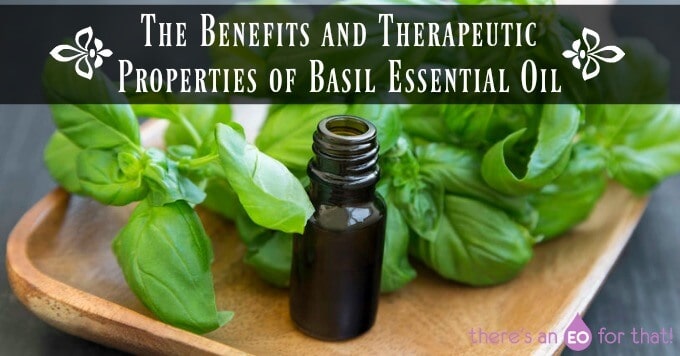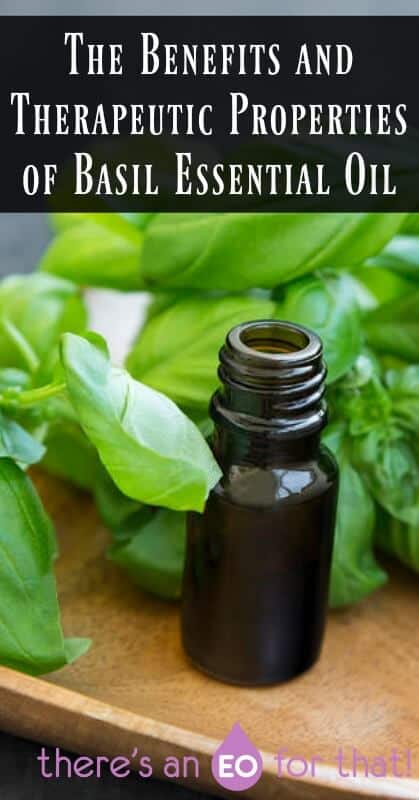Basil has always been a favorite aroma of mine since I was a child whether it was sprinkled over fresh spaghetti sauce, tossed in bruschetta, or simply skewered with ripe cherry tomatoes and chunks of mozzarella. Over the ages (since 1098 to be exact), basil has been used for a variety of ills and ailments ranging from physical discomfort to emotional and mental fatigue. Basil essential oils is a must have for every essential oil enthusiast!
The Benefits and Therapeutic Properties of Basil Essential Oil
Botanical Names
Ocimum basilicum
Basil is also known as sweet basil and common basil
Family
Labiatae or Lamiaceae (the mint family)
Origins
Basil is an annual herb that is native to tropical Asia and Africa. There are many varieties of basil; each with its own unique essential oil characteristic of the environment, temperature, geography, and soil where it is grown.
The most commonly available basil essential oils are:
1. Sweet Basil aka European Basil. This essential oil has a high percentage of linalool.
2. Exotic or Reunion Basil which is distilled in Thailand, the Comoro Islands, the Malagasy Republic, and in the Seychelles. It has a high content of methyl chavicol.
There are five main chemotypes found in basil essential oil:
1. Linalool
2. Methyl chavicol
3. Methyl eugenol
4. (E)- Methyl cinnamate
5. Eugenol
Extraction Method and Essential Oil Characteristics
Basil is steam distilled from the leaves and flowering tops of Ocimum basilicum. It has a penetrating green, sweet, herbaceous, and uplifting aroma and makes a lovely undertone in perfumes. Basil essential oil with high methyl chavicol content has a mild anise-like aroma.
Sweet basil essential oil is a very pale yellow, clear, and liquid with a sweet-spicy and fresh top note and a balsamic woodsy undertone.
Exotic basil essential oil is pale-yellow to pale-green liquid with an herbaceous and camphorous top note and an intense anise-like undertone.
Historical and Traditional Use
Basil was so highly prized that its latin name comes from the word “basileum” which means royal or king.
In India, basil is dedicated to the god Vishnu and is believed to be the incarnation of his wife Lakshmi; the goddess of fortune and beauty and was thus used by Indian women to attract suitors by wearing it in their hair. In India, this basil is known as holy basil or Tulsi. It is believed that holy basil can protect one from evil spirits and unfortunate events.
In the 16th century, the powdered leaves of basil were inhaled to treat migraines and various chest infections.
Pliny recommended basil for use as a diuretic and as a remedy for jaundice and epilepsy. In the middle ages, basil was prescribed for depression and melancholy.
“The smell of basil taketh away sorrowfulness and maketh a man merry and glad.”
Chemical Components
In aromatherapy, it is preferable to use the linalool chemotype of basil essential oil since there are safety concerns surrounding the estragole content of other basil oils.
The phenolic ethers found within basil essential oil gives it its antispasmodic properties making it an ideal oil to use for abdominal spasms and pain as well as asthmatic spasms.
Therapeutic Action
Basil essential oils is known to be analgesic, antidepressant, antiseptic, antispasmodic, carminative, cephalic, digestive, emmenagogue, expectorant, febrifuge, nervine, and sudorific in nature.
The methyl cinnamate and methyle chavicol contained in basil essential oil is known to be an effective insecticide. Basil chemotype methyl chavicol has higher antimicrobial and anti-fungal properties compaired to other basil chemotypes.
Blends Well With
Bergamot, black pepper, cardamom, citronella, clary sage, coriander, geranium, hyssop, lavender, lime, marjoram, melissa, neroli, oakmoss, orange, peppermint, rosemary, sandalwood, spearmint, verbena, and ylang ylang.
Indications for Basil Essential Oil
Digestive System
Basil essential oil is known to ease vomiting, nausea, gastric spasms and upset, dyspepsia, and the hiccups.
To do this, you can apply diluted basil essential oil to your palm, rub your hands together, and breathe in slowly for several breaths. You can also apply it diluted to the abdomen during abdominal distress.
Nervous System
Basil essential oil is one of the best oils for mental clarity, relieving emotional and intellectual fatigue, and instilling fresh mental strength when diffused or inhaled from the palms. It is therefore useful in all types of nervous disorders especially where indecision, hysteria, or mental weakness are indicated.
Basil is also a wonderful EO for those who need a sense of protection against feelings of malaise, low resistance to life’s struggles, nervous exhaustion, and feelings of vulnerability. This is because basil is extremely relaxing and stress relieving.
It is especially indicated for those who “digest” their worries at night.
Immune System
Basil is an excellent oil to use for reducing fever (febrifuge) and to promote sweating (sudorific). It’s a must have in ever medicine chest for this reason alone! It’s also useful as a means to speed up recover from ear infections if applied diluted behind the ears.
Respiratory System
Basil EO is indicated for relieving spasmodic lunch conditions such as asthma, bronchitis, whooping cough, influenza, and sinus congestion.
Reproductive System
Using basil essential oil diluted on the abdomen will help induce delayed menstruation, reduce cramps, and balance scanty bleeding.
Skin Care
Can be used in small amounts to smooth out uneven skin tone, soothe skin irritations, clear up acne, and reduce inflammation. Basil is also an excellent muscle relaxant for sore tired muscles.
Energetics
Basil is a warming oil that perfect for tonifying yang constitutions that suffer from brain fog, mental exhaustion, and depression. It lifts the spirit and dispels feelings of melancholy and complacency.
Personality Profile
Uplifting, stimulating, clarifying, and awakening in nature.
Mode of Administration
Topically through massage, ointments, inhalation, diffusion.
Safety
If you have sensitive skin, avoid basil oils with high amounts of methyl charvicol and methyl cinnamate.
Basil essential oils is contraindicated during pregnancy.
Maximum dilution for the absolute is 1.5% and the essential oil is 3.3%.
Want to learn more? Check out the Essential Oil Profiles Page!
References
Complete Aromatherapy Handbook
Essential Oil Safety
The Complete Guide to Aromatherapy
The Encyclopedia of Essential Oils
 This post contains affiliate links. We are a participant in the Amazon Services LLC Associates Program, an affiliate advertising program designed to provide a means for us to earn fees by linking to Amazon.com and affiliated sites. Please read my full disclosure and disclaimer.
This post contains affiliate links. We are a participant in the Amazon Services LLC Associates Program, an affiliate advertising program designed to provide a means for us to earn fees by linking to Amazon.com and affiliated sites. Please read my full disclosure and disclaimer. 


Leave a Reply